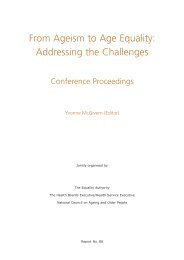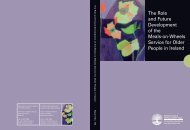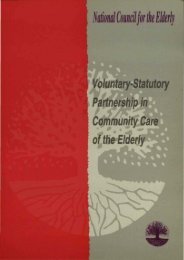Improving Quality of Life for Older People in Long-Stay Care ...
Improving Quality of Life for Older People in Long-Stay Care ...
Improving Quality of Life for Older People in Long-Stay Care ...
- No tags were found...
Create successful ePaper yourself
Turn your PDF publications into a flip-book with our unique Google optimized e-Paper software.
express<strong>in</strong>g their preferences or views on the quality <strong>of</strong> their lives. Cognitiveimpairment, memory loss and the <strong>in</strong>ability to communicate do pose difficulties<strong>in</strong> obta<strong>in</strong><strong>in</strong>g self-report measures <strong>of</strong> quality <strong>of</strong> life (Lawton, 1997; Bond, 1999).There<strong>for</strong>e, rely<strong>in</strong>g on self-reported measures <strong>of</strong> quality <strong>of</strong> life alone poses the risk<strong>of</strong> exclud<strong>in</strong>g the perspective <strong>of</strong> a sizeable proportion <strong>of</strong> the nurs<strong>in</strong>g home population(Kane, 2003a; 2003c). Strategies adopted to assess the quality <strong>of</strong> life <strong>of</strong> people withdementia must be extended to <strong>in</strong>clude direct observation and proxy reports, as wellas self-report<strong>in</strong>g (Lawton, 1991; Hubbard et al., 2003; Kane, 2003a; 2003c). Lawton(1997) believes that proxy measures <strong>of</strong> quality <strong>of</strong> life can be obta<strong>in</strong>ed <strong>for</strong> objectivequality <strong>of</strong> life doma<strong>in</strong>s such as activities <strong>of</strong> daily liv<strong>in</strong>g, behaviour, social <strong>in</strong>teraction,affect states and environmental quality. Proxy measures <strong>in</strong>clude direct observationand attribute rat<strong>in</strong>gs. Direct observation entails directly monitor<strong>in</strong>g behaviour <strong>in</strong>order to capture occurrences <strong>of</strong> particular events. Attribute rat<strong>in</strong>gs are s<strong>in</strong>gle rat<strong>in</strong>gs<strong>of</strong> quality <strong>of</strong> life based on observations <strong>of</strong> a resident over an extended time period.While direct observation may be more time consum<strong>in</strong>g, it may be more reliablethan attribute rat<strong>in</strong>gs which can be subject to observer bias.70Hubbard et al. (2003) utilised <strong>in</strong>terview and observational methods to elicit theperceptions <strong>of</strong> nurs<strong>in</strong>g home residents suffer<strong>in</strong>g from dementia. The researchersfound that the observation technique provided a more spontaneous and lessconstra<strong>in</strong>ed means <strong>of</strong> ascerta<strong>in</strong><strong>in</strong>g what <strong>in</strong>fluenced a resident’s quality <strong>of</strong> life.The observational method also granted more control to the participant. Althoughthe participants were unable to thoroughly articulate their feel<strong>in</strong>gs and perceptionsregard<strong>in</strong>g quality <strong>of</strong> life, the researchers were able to establish specific doma<strong>in</strong>sby observ<strong>in</strong>g and analys<strong>in</strong>g the resident’s behaviour and casual conversation. Thestudy also highlighted the importance <strong>of</strong> flexibility <strong>in</strong> measur<strong>in</strong>g quality <strong>of</strong> life <strong>of</strong>dementia sufferers. The unpredictable and volatile nature <strong>of</strong> the disease means thatthe lucidness and ability <strong>of</strong> sufferers to communicate will vary from day to day and,<strong>in</strong>deed, from hour to hour (Hubbard et al., 2003). Accord<strong>in</strong>g to Lawton et al. (1999),while residents suffer<strong>in</strong>g from moderate to severe dementia may no longer be ableto verbally communicate their op<strong>in</strong>ions on quality <strong>of</strong> life, they may still be able toexpress their preferences through their emotions. By observ<strong>in</strong>g and <strong>in</strong>terpret<strong>in</strong>gresidents’ displays <strong>of</strong> emotions, nurs<strong>in</strong>g home staff and care givers can adapt thenature <strong>of</strong> their care giv<strong>in</strong>g <strong>in</strong> order to <strong>in</strong>fluence and improve the quality <strong>of</strong> life <strong>of</strong>the patient (Lawton et al., 1999).Kane (2003c) found that significant numbers <strong>of</strong> residents who scored poorly ona cognitive score were able to answer a long quality <strong>of</strong> life <strong>in</strong>terview. This f<strong>in</strong>d<strong>in</strong>ghas been supported by other researchers (Brod et al., 1999; Logsdon et al., 1999).In a study by Coen et al. (1993), patients suffer<strong>in</strong>g from mild dementia were able to<strong>Improv<strong>in</strong>g</strong> <strong>Quality</strong> <strong>of</strong> <strong>Life</strong> <strong>for</strong> <strong>Older</strong> <strong>People</strong> <strong>in</strong> <strong>Long</strong>-<strong>Stay</strong> <strong>Care</strong> Sett<strong>in</strong>gs <strong>in</strong> Ireland















